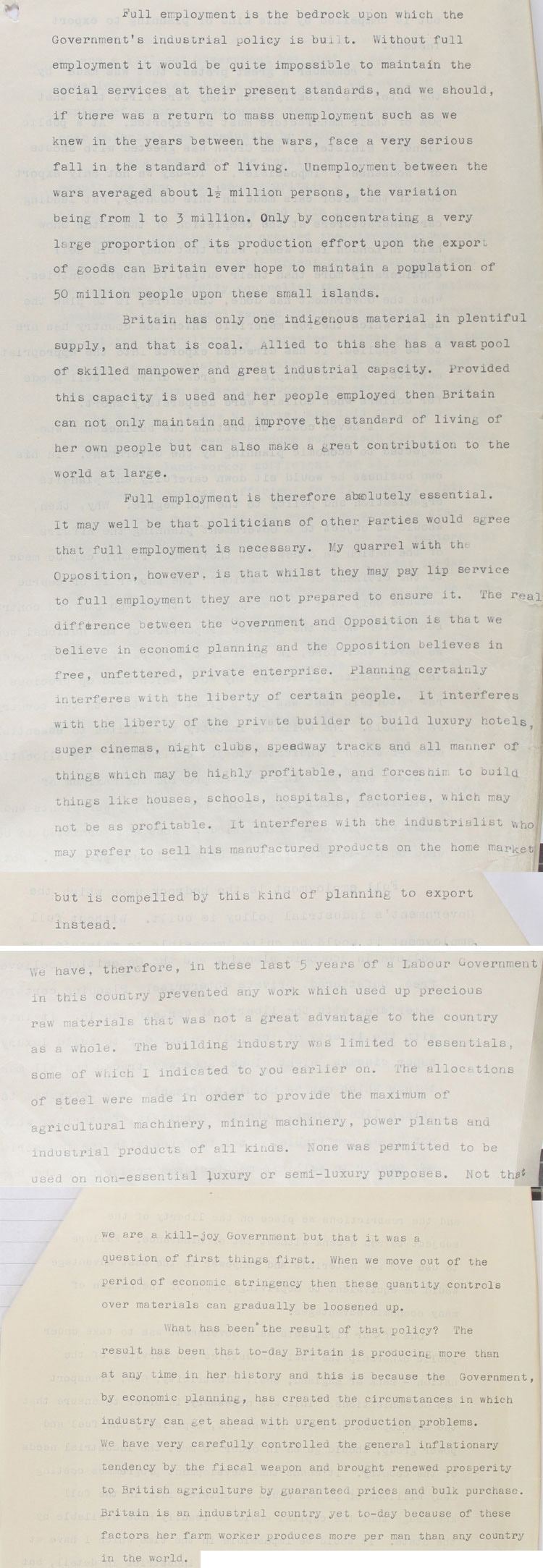
Extract of speech given to the German Section of the Foreign Office by Alfred Robens MP, Parliamentary Secretary for Ministry of Fuel & Power, 1st November, 1950 (LAB 43/35)
Full employment is the bedrock upon which the Government’s industrial policy is built.
Without full employment it would be quite impossible to maintain the social services at their present standards, and we should, if there was a return to mass unemployment such as we knew in the years between the wars, face a very serious fall in the standard of living. Unemployment between the wars averaged about 1½ million persons, the variation being from between 1 to 3 million. Only by concentrating a very large proportion of its production effort upon the export of goods can Britain ever hope to maintain a population of 50 million people upon these small islands,
Britain has only one indigenous material in plentiful supply, and that is coal. Allied to this she has a vast pool of skilled manpower and great industrial capacity. Proved this capacity is used and her people employed then Britain can only maintain and improve the standard of living of her own people but can also make a great contribution to the world at large.
Full employment is therefore absolutely essential. It may well be that politicians of other parties would agree that full employment is necessary. My quarrel with the Opposition, however, is that whilst the may pay lip service to full employment they are not prepared to ensure it. The real difference between the Government and opposition is that we believe in economic planning and the Opposition believes in free, unfettered, private enterprise. Planning certainly interferes with the liberty of certain people. It interferes with the liberty of the private builder to build luxury hotels, super cinemas, night clubs, speedway tracks and all manner of things which may be highly profitable, and force him to build things like houses, schools, hospitals, factories, which may not be profitable. It interferes with the industrialist who may prefer to sell his manufactured products on the home markets but is compelled by this kind of planning to export instead.
…
We have, therefore, in these last 5 years of Labour Government in this country prevented any work which used up precious raw materials that was not a great advantage to the country as a whole. The building Industry was limited to essentials, some of which I indicated to you earlier on. The allocations of steel were made in order to provide the maximum of agricultural machinery, mining machinery, power plants and industrial products of all kinds. None were permitted to be used on non-essential luxury or semi-luxury purposes, not that we are a kill-joy Government but it was a question of first things first. When we move out of the period of economic stringency then these quality controls over materials can gradually be loosened up.
What has been the result of that policy? The result has been that to-day Britain is producing more than at any time in her history and this is because the Government, by economic planning, has created the circumstances in which industry can get ahead with urgent production problems. We have very carefully controlled the general inflationary tendency by the fiscal weapon and brought renewed prosperity to British agriculture by guaranteed prices and bulk purchases. Britain is an industrial country yet today because of these factors her farm worker produces more per man than any country in the world.
…
